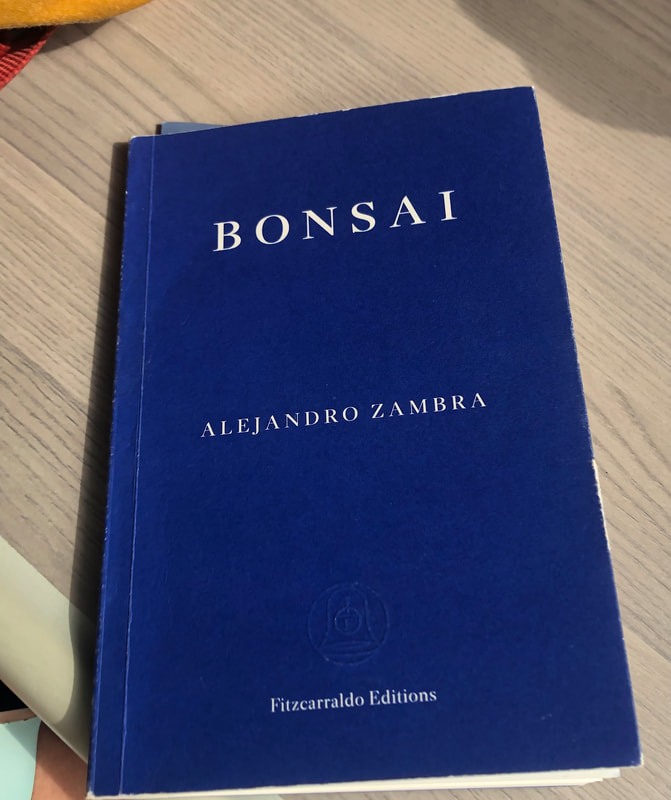Bonsai
Author: Alejandro Zambra, Translated by Megan McDowell
Published by: Fitzcarraldo Editions
Pages: 74
Format: Paperback
My Rating ★★★★★
Published by: Fitzcarraldo Editions
Pages: 74
Format: Paperback
My Rating ★★★★★
Bonsai is the story of Julio and Emilia, two young Chilean students who, seeking truth in great literature, find each other instead. Like all young couples, they lie to each other, revise themselves, and try new identities on for size, observing and analyzing their love story as if it’s one of the great novels they both pretend to have read.
As they shadow each other throughout their young adulthoods, falling together and drifting apart, Zambra spins a formally innovative, metafictional tale that brilliantly explores the relationship among love, art, and memory.
As they shadow each other throughout their young adulthoods, falling together and drifting apart, Zambra spins a formally innovative, metafictional tale that brilliantly explores the relationship among love, art, and memory.
My thoughts:
‘A bonsai has to be nurtured and truly loved or else it will die; likewise, unless one does the same thing with human love, that will also die.’
I just read this yesterday on my train journey and I can’t stop thinking about it. Bonsai by can be read in little more than an hour but it will stay with you for a lot longer than that. This is a philosophical, thought-provoking novella and the story is spell-binding.
Julio and Emilia have a soft spot for deceit in all its forms. They meet when they are university students of literature, so for a start, they are lovers of elaborate lies. It’s literature that binds the couple together and gives purpose to their relationship. They read to each other, and they even lie to each other about the books they’ve read.
Eventually, their lives move forward and they are no longer together. However, they still enjoy some occasional dishonesty. Emilia lies to her co-workers about being married, and even shows up at a party with a friend’s husband to act as her imaginary spouse. Julio is also a very inventive liar. When he doesn't get a job transcribing a famous author's new novel, he decides to fake that he's doing the job and begins to write the novel he thinks the famous author would have written. He ends up calling it Bonsai, which may or may not be the novel we have just read.
There is a sweet simplicity and breathless fluidity to the writing and not a single word is wasted in Alejandro Zambra’s elegantly told story. Bonsai traces through a few episodes in the lives of Julio and Emilia, two young people who fall for one another at university - bonding over their love of literature and discussion - then retreat from one another's lives. This is really beautifully done. It’s a novella but written with the same precision and impact as the best short stories.
Zambra's story is about the ramifications of falling in and out of love, of lying about reading Proust, about bonsais. This is a melancholy story which can be devoured in one sitting but will make you want to read it again right away to recapture the finer points you might have missed. A very sharp and unique little novel. Zambra writes in such a fresh way. Just masterfully done.
Overall reaction:
‘A bonsai has to be nurtured and truly loved or else it will die; likewise, unless one does the same thing with human love, that will also die.’
I just read this yesterday on my train journey and I can’t stop thinking about it. Bonsai by can be read in little more than an hour but it will stay with you for a lot longer than that. This is a philosophical, thought-provoking novella and the story is spell-binding.
Julio and Emilia have a soft spot for deceit in all its forms. They meet when they are university students of literature, so for a start, they are lovers of elaborate lies. It’s literature that binds the couple together and gives purpose to their relationship. They read to each other, and they even lie to each other about the books they’ve read.
Eventually, their lives move forward and they are no longer together. However, they still enjoy some occasional dishonesty. Emilia lies to her co-workers about being married, and even shows up at a party with a friend’s husband to act as her imaginary spouse. Julio is also a very inventive liar. When he doesn't get a job transcribing a famous author's new novel, he decides to fake that he's doing the job and begins to write the novel he thinks the famous author would have written. He ends up calling it Bonsai, which may or may not be the novel we have just read.
There is a sweet simplicity and breathless fluidity to the writing and not a single word is wasted in Alejandro Zambra’s elegantly told story. Bonsai traces through a few episodes in the lives of Julio and Emilia, two young people who fall for one another at university - bonding over their love of literature and discussion - then retreat from one another's lives. This is really beautifully done. It’s a novella but written with the same precision and impact as the best short stories.
Zambra's story is about the ramifications of falling in and out of love, of lying about reading Proust, about bonsais. This is a melancholy story which can be devoured in one sitting but will make you want to read it again right away to recapture the finer points you might have missed. A very sharp and unique little novel. Zambra writes in such a fresh way. Just masterfully done.
Overall reaction:


